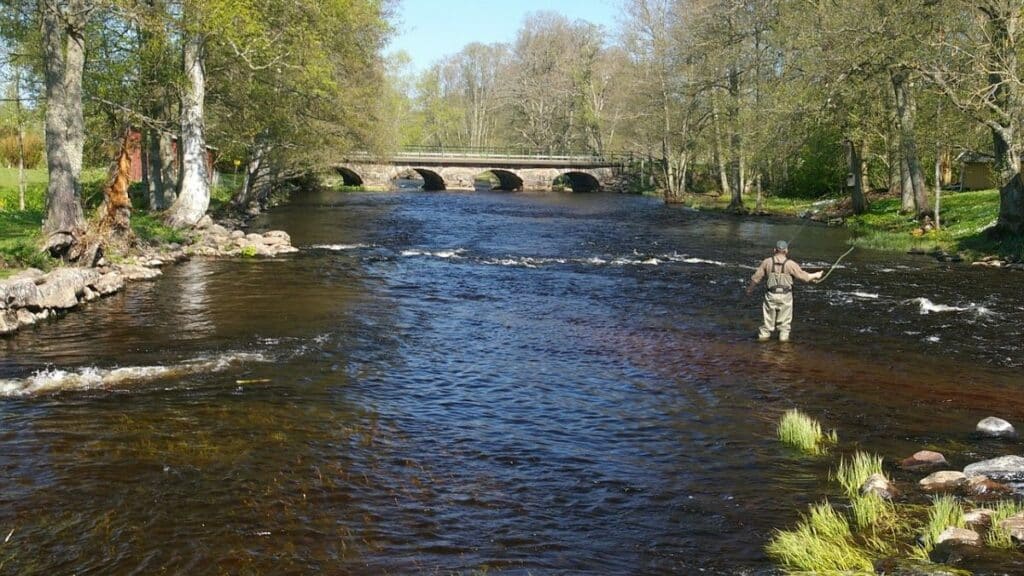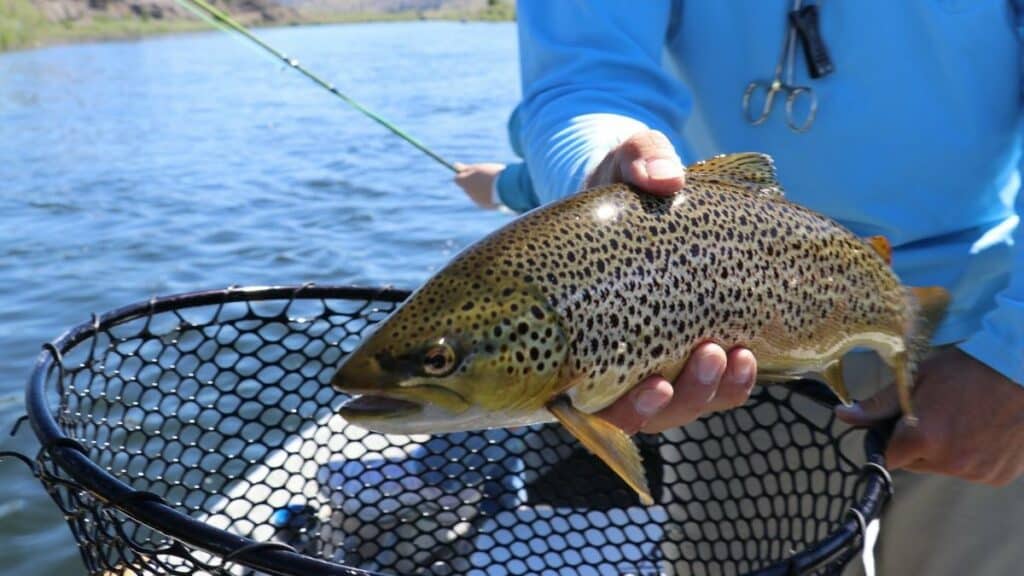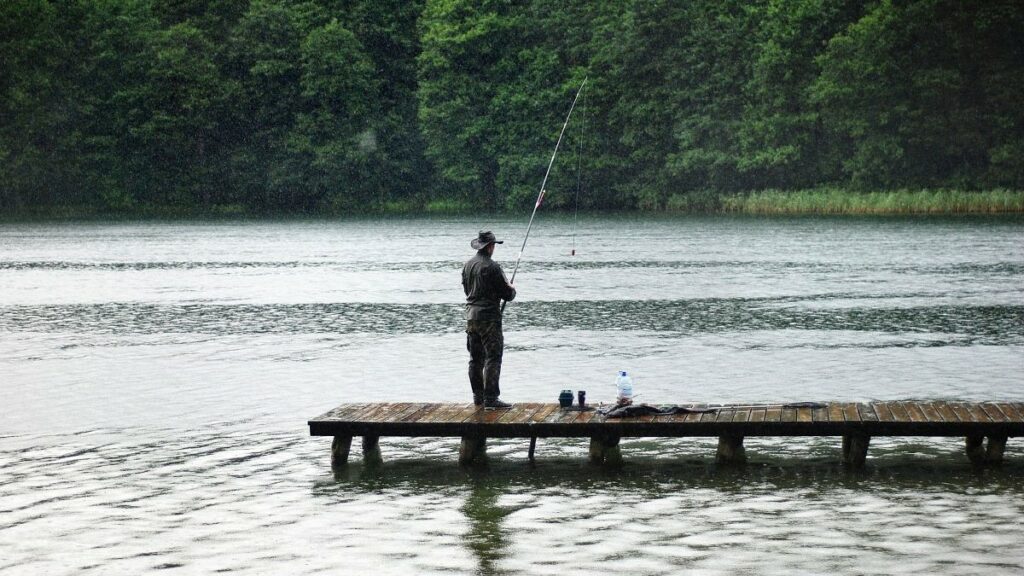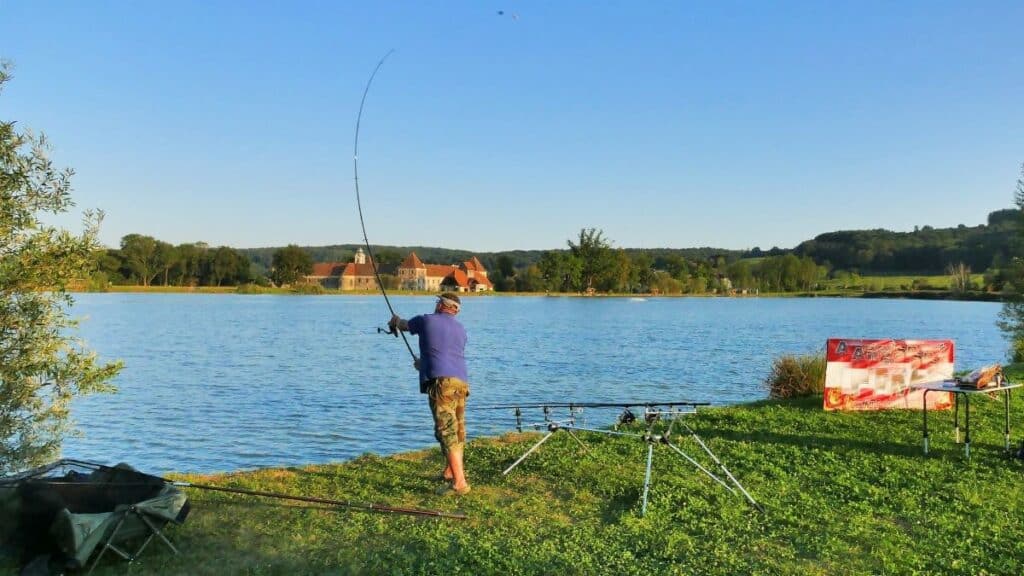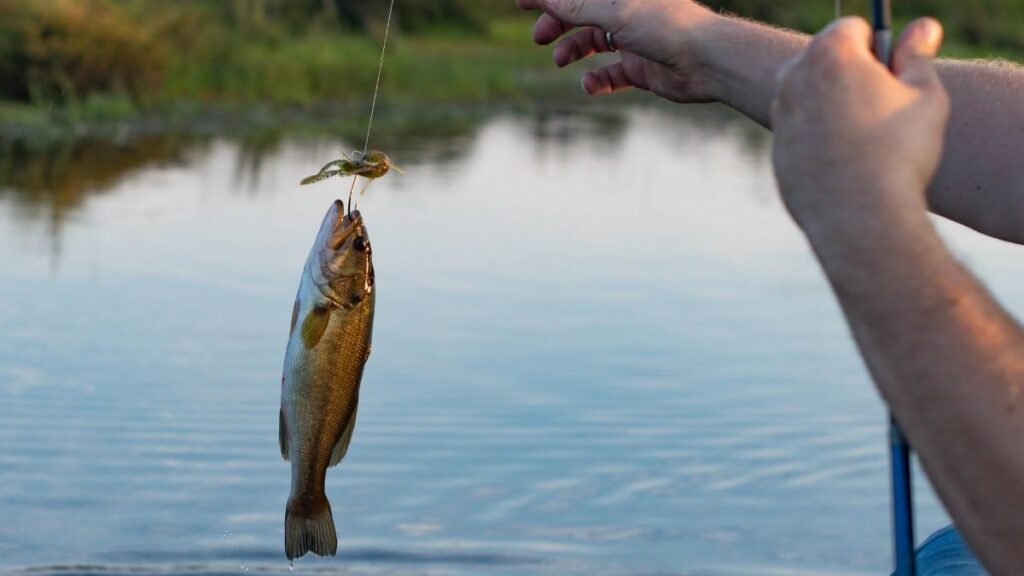If you are new, you can use our River Fishing Tips for Beginners to get started. Even if you have experience, you will find some useful river fishing tips and techniques.
Fishing in a river is easier than any other body of water. But it can be a little tricky if the water is flowing fast. To make the most of your river fishing trip, you need to learn some river fishing tips and techniques.
What Gear Do You Need?
First, you need to learn about the equipment required for river fishing.
You may not have to buy the equipment for your first fishing trip. There are clubs and activity centers where they teach you fishing and lend you equipment. You pay the rent and return the equipment and boat after your fishing lessons. You can even get one of the Best Baitcasting Reels Under $150 researched and tested by our team.
River Fishing Rod and Reels
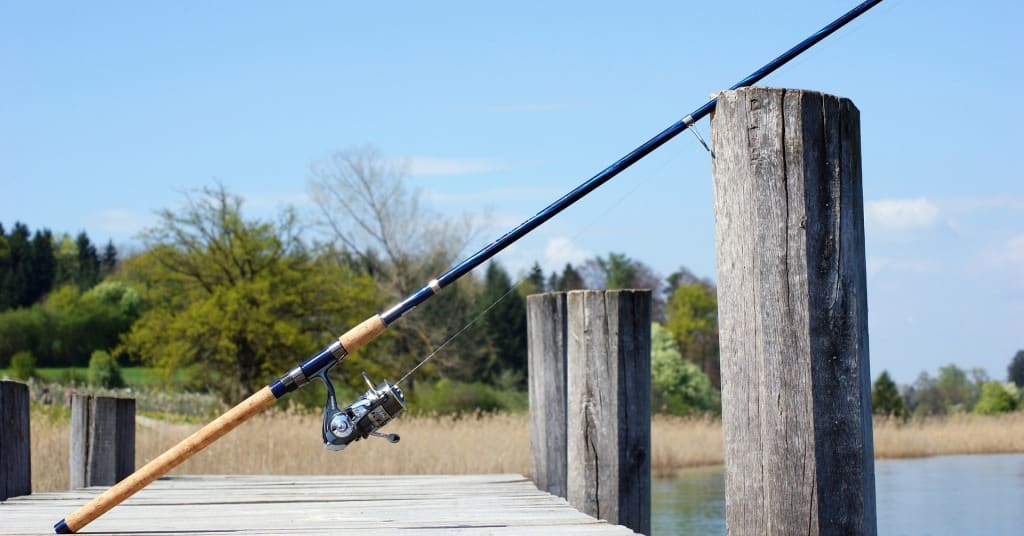
There are many types of fishing rods out there. The first thing you should look at in a rod is its sturdiness. I prefer the pole made of fiberglass or graphite.
The next important thing is the length of the pole. The typical length, which works most of the time, is around 8 feet.
If you are a beginner, you can check out some of the Best Fishing Rod and Reel Combos for Beginners out there on the market. You don’t need to break the bank to buy a quality fishing rod and reel.
River Fishing Lures and Baits
Rivers have a variety of fish in them like trout, bass, and carp. We all know that these fish eat different small creatures.
A bait is a living creature used to lure the fish you want to catch to your line. Bait can be frozen if that’s what you need,
But live bait is more responsive, so using it will get you better results. Live bait has a stronger odor and that is why it attracts more fish. It works even better if you bounce the bait along with the current.
A very common type of bait is bloodworms. But you should be careful while handling them as they can bite your finger. Choosing the right bait is dependent on the kind of fish you want to catch.
The Best Places to Fish in Any River
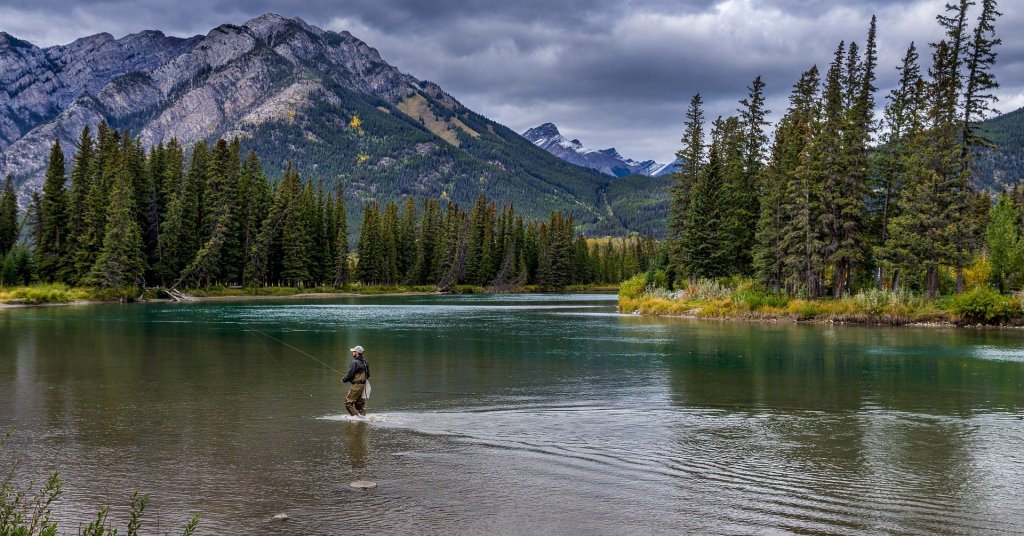
It is important to select your location. If you go to a well-stocked part, chances of catching fish will increase. That is understandable, but the question is how to find the right spot. If you are a beginner, then you can check out Ogofishing.com to find the right fishing spot, gear, and a community of fellow fishermen.
Choose the spot wisely by observing the outlook of the river. It is better to choose the curve or bends as the river brings the food that the fish eat to the much-curved edges.
Outside edges of river curves are a great place to find catfish. The places where faster and slower moving water blends bring more food and ultimately more fish.
The places where there are weeds have more fish and can be good spots for fishing. It is also easier to fish in the calmer river, as fish can smell the bait better. But if you cannot find a calm river, choose the part of the river with slow-moving currents.
When is The Best Time for River Fishing?
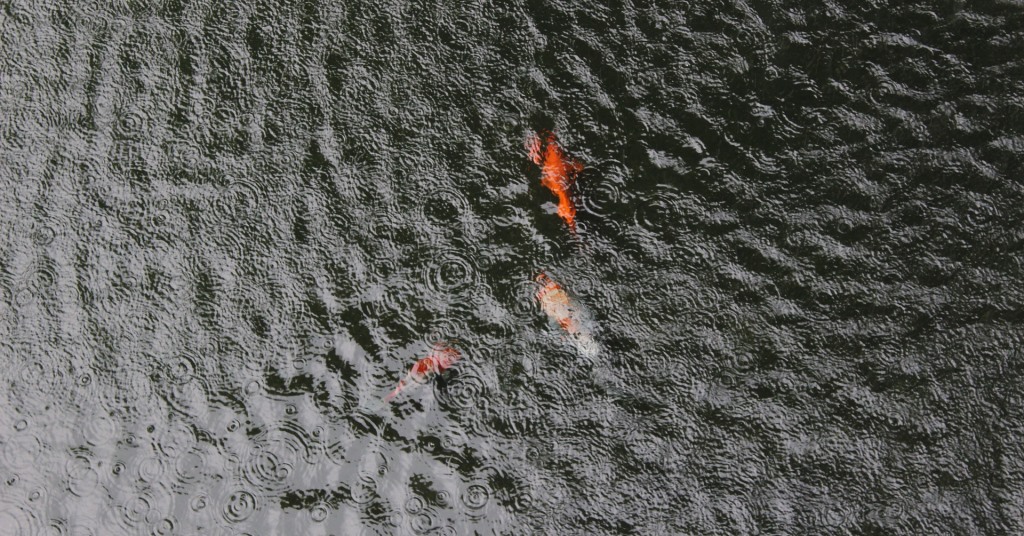
Selecting the time for fishing is as important as the location. Chilly weather can be difficult for any outdoor activities including fishing. But from the fish’s point of view, they love the cold wet season.
So, if you can, choose a rainy day to go fishing. The fish will be active and the chances of you getting lucky will be higher. But don’t forget to carry a lightweight rain suit on your fishing day out.
Other than that, the ideal time for fishing is the beginning of the day. It is dawn when the fish are most active before sunrise: they don’t seem very fond of light.
The Best Technique for River Fishing
First, you need to bait your hook. It can be difficult if you are squeamish, but once you get the hang of it you will find it easy.
After that, you attach a “sinker” to your line, so that bait stays on the river floor. This will protect your bait from flowing away with the current. We suggest that beginners go for a copolymer fishing line.
Now hold the rod and swing it back over your head and throw the line in the river. Make sure that you have a good quality rod otherwise, you might lose it to the currents of the river.
The fish won’t come running to your bait immediately, but wouldn’t it be wonderful if they did?
You may have to wait for hours before you might get a fish on your hook. But holding the rod all the time is tiring and pointless. So, you can rest it on any support you can find.
When the fish bites your bait, the fishing rod gives a jerk or several jerks as the fish is trying to get away. If you are not holding the rod then you won’t be able to know when the fish bites.
You can either add a small bell hanging on the rod or you can rest your rod against a tin can, so it makes a noise when moved.
Retrieving and Handling the Fish
When you feel the jerk or pull of the fish biting, you should be quick to hold your fishing rod and pull.
But if you pull in the wrong direction, you might lose the fish. As they say, practice makes you perfect, so you will learn how to pull with time.
Do not pull the rod toward you as the fish might slam into you. But pull upward in the air, and when the fish gets out of the water, let it fall to the ground.
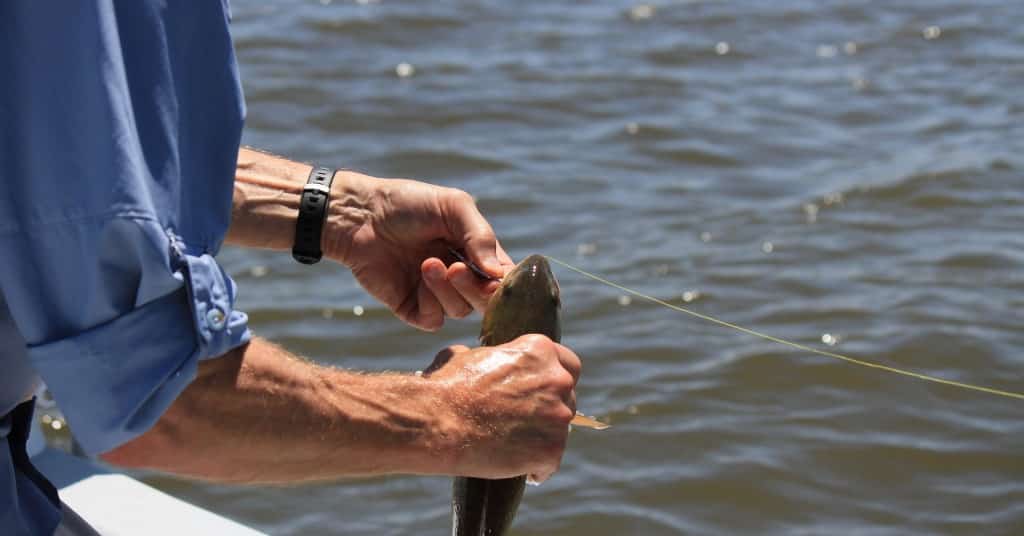
The fish will flap itself to try to get back in the water, so you need to hold it to the ground. When it becomes motionless, take the hook out carefully.
Now the fish is yours, cut it clean, and cook it to enjoy your effort. If you were fishing for fun and don’t intend to eat the fish, then let it go in the water again.
If you plan to release the fish, then don’t wait for it to get motionless. Quickly remove the hook and release the fish back into the water.
You must match your reel size with the fish you are targeting to successfully retrieve the fish. If you are targeting smaller fish, then you must use a small-size reel.
Similarly, if you are targeting a large fish like Pike, you must use a medium or large size reel to handle the fish. You can check out our pick of the Best Baitcasting Reels for Pike if you need help picking a suitable reel.
Best River Fishing Tips for Beginners
If you fish regularly, soon you will be an expert in fishing techniques. You will be handling the gear with confidence.
But if you are a first-timer, or fishing occasionally, then you will need some tips and tricks to help you out.
Follow Safety Regulations
Safety should always be the first thing to consider before fishing. Once you are following all the safety measures, you would enjoy fishing more, since your mind will be at ease.
First thing is that you should know how to swim. If you don’t know how to swim, then you should fish wearing a personal flotation device.
If you want to wade in the water, make sure you know how deep it is. Also, before going into the water, wear fishing waders and a wader belt in case you fall.
Use the Bottom Bouncing Technique
If you do that along with the current, you can get the fish around the ledges and deeper cuts around the river.
Another tip is to cast spinners upstream so that you can catch fish going downstream for food. You can also use fishing jigs in areas of slow currents, especially near the mouth of the river.
Use Polarized Glasses
Polarized glasses can be very helpful for viewing and identifying targets. They will let you see the river and help you to locate where fish are moving.
Persistence and Patience
You would enjoy fishing if you take it as a hobby. It is an activity to relax and enjoy a holiday with friends. As it is for those who have the time and patience to wait for hours, you should have the time at your disposal.
If you plan to go fishing while traveling then the Best Backpacking Fishing Rods that we recommend to our readers might interest you.
What Fish Species Can You Catch on Rivers?
There are certain fish that are native to certain areas and you should be aware of that. If you plan to fish in a certain area, you should know which kind of fish you will be dealing with. This helps a lot in the selection of the bait. For example, the right bait for largemouth bass is different than the right bait for trout.
If you know your target, you can choose which kind of bait you need. You can use both live bait and plastic one. Live bait works wonders for crawfish and minnow or plastic bait for smallmouth bass.
Local Laws and Permissions
Well, ask about the legal fishing options available from the local fish and game agencies. They will also tell you the limit and variety of fish that are available.
Also, it is advisable to ask them if you can keep the fish you will catch. There are places where you can only catch and release the fish back into the river.
The river might fall into someone’s land. So you should get permission from the authority responsible to give permission.
You cannot fish in a river for commercial purposes. The reason is that first, the authorities don’t let you do that. Second, a single rod and person cannot achieve the purpose. Oceans and seas are more appropriate with a proper workforce, equipment, and transport.
Fishing License
Whether you need a fishing license or not depends upon the local laws where you plan to fish.
In some places, you might not need a license, while in others you might need one.
Most states have some kind of exemption for their residents. E.g. in Virginia, any resident under 16 years of age does not need a license for trout fishing.
Now you can apply for a fishing license online for most places if you have the right documentation.
But even with lenient license rules, the basic rule for most places is that you first complete a fishing course.
Conclusion
We have tried our best to help you learn how to start fishing in the river.
With the right gear, fishing tips, and techniques, you can get started with river fishing. You can catch fish and enjoy an outdoor activity-filled day by barbecuing the fish.
Make sure you choose a suitable day and time. Don’t forget to carry suitable bait according to the fish you plan to catch. Also, knowing your river is a smart thing to do. Otherwise, you might end up buying bait for the fish that is non-existent in the river.
Moreover, be sure that you can keep your spoils when you leave. Learn about local laws, so there are no surprises out there to spoil your fun.
We hope you liked our river fishing tips for beginners. If you want to add anything or share your experience, please comment underneath. Also, if you found this information useful, share it with your friends.

